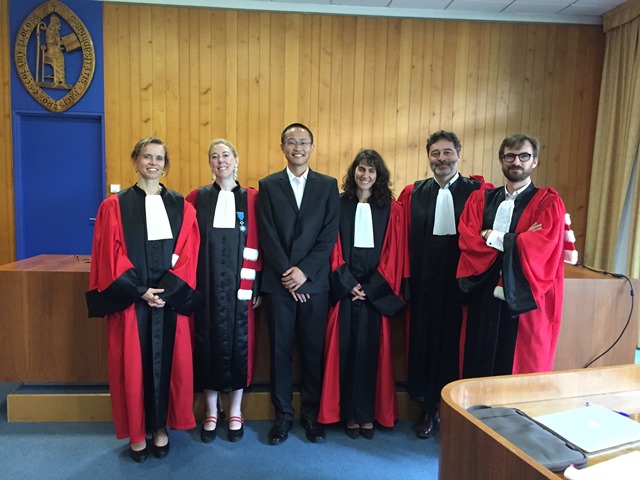Recherche
Thèse soutenue par Peng Zheng "La protection du droit d'auteur en Chine dans l'environnement numérique" dirigée par Céline Castet-Renard (IRDEIC)
Recherche - Thématique
Thèse soutenue par Peng Zheng "La protection du droit d'auteur en Chine dans l'environnement numérique" dirigée par Céline Castet-Renard (IRDEIC)
le 11 juillet 2017
14h Salle des thèses
L’IRDEIC a le plaisir de vous informer que M. Peng Zheng a soutenu sa thèse avec succès sur le sujet suivant "La protection du droit d'auteur en Chine dans l'environnement numérique"
Peng Zheng a soutenu publiquement ses travaux de thèse intitulé "La protection du droit d'auteur en Chine dans l'environnement numérique".
En Chine, la protection du droit d’auteur dans l’environnement numérique est un problème au niveau international et national. Pourquoi le droit d’auteur ne peut-il pas être protégé correctement ? Quels sont les droits et les outils mis à la disposition des auteurs ? Sous la pression de la rétorsion commerciale des États-Unis, la Chine a ratifié la Convention de Berne en 1992. Le premier droit d’auteur en Chine et les deux révisions avaient principalement pour but de se conformer à la Convention de Berne. Autrement dit, le droit d’auteur chinois est artificiel. Il ne représente pas la réconciliation de conflits d'intérêts différents. Les actions de la mise en œuvre du droit d’auteur en environnement numérique ont été entreprises par les autorités chinoises. Elles pourraient être très efficaces. Des sites Internet illégaux sont contrôlés et le contenu qui atteint au droit d’auteur est supprimé. Néanmoins, les actions pourraient être excessives. L’environnement numérique a non seulement augmenté la capacité individuelle de la reproduction et la transmission des œuvres, mais a aussi changé la façon dont les œuvres peuvent être créées. Comment protéger les droits d’auteur existants, d’un côté, et stimuler la créativité individuelle des internautes, d’un autre côté?
Chinese copyright protection in the digital environment has been a problem at both international and national level. Why Chinese copyright could not be properly protected?What rights and enforcement tools the copyright holders have? Under the pressure of the US trade retaliation, China ratified the Berne Convention in 1992. The first Chinese Copyright Law and the later two revisions were mainly for the purpose of complying with the Berne Convention. In other words, the Chinese Copyright Law is artificial. It is not the reconciliation of the conflicts of different interests. Copyright enforcement actions have been undertaken by the Chinese copyright authorities in the digital environment. They could be very efficient. Major pirating websites are seized and enormous infringing contents are taken down. However, the actions could also be excessive. The digital environment not only boosted the individual capacity of the reproduction and transmission of works, but also changed the way of how works could be created. How to protect the existing copyright on the one hand, to simulate the individual user’s creativity, on the other?
En Chine, la protection du droit d’auteur dans l’environnement numérique est un problème au niveau international et national. Pourquoi le droit d’auteur ne peut-il pas être protégé correctement ? Quels sont les droits et les outils mis à la disposition des auteurs ? Sous la pression de la rétorsion commerciale des États-Unis, la Chine a ratifié la Convention de Berne en 1992. Le premier droit d’auteur en Chine et les deux révisions avaient principalement pour but de se conformer à la Convention de Berne. Autrement dit, le droit d’auteur chinois est artificiel. Il ne représente pas la réconciliation de conflits d'intérêts différents. Les actions de la mise en œuvre du droit d’auteur en environnement numérique ont été entreprises par les autorités chinoises. Elles pourraient être très efficaces. Des sites Internet illégaux sont contrôlés et le contenu qui atteint au droit d’auteur est supprimé. Néanmoins, les actions pourraient être excessives. L’environnement numérique a non seulement augmenté la capacité individuelle de la reproduction et la transmission des œuvres, mais a aussi changé la façon dont les œuvres peuvent être créées. Comment protéger les droits d’auteur existants, d’un côté, et stimuler la créativité individuelle des internautes, d’un autre côté?
Chinese copyright protection in the digital environment has been a problem at both international and national level. Why Chinese copyright could not be properly protected?What rights and enforcement tools the copyright holders have? Under the pressure of the US trade retaliation, China ratified the Berne Convention in 1992. The first Chinese Copyright Law and the later two revisions were mainly for the purpose of complying with the Berne Convention. In other words, the Chinese Copyright Law is artificial. It is not the reconciliation of the conflicts of different interests. Copyright enforcement actions have been undertaken by the Chinese copyright authorities in the digital environment. They could be very efficient. Major pirating websites are seized and enormous infringing contents are taken down. However, the actions could also be excessive. The digital environment not only boosted the individual capacity of the reproduction and transmission of works, but also changed the way of how works could be created. How to protect the existing copyright on the one hand, to simulate the individual user’s creativity, on the other?
Partenaires :
Composition du jury :
- Mme Céline Castets-Renard Université Toulouse 1 Capitole
- Mme Agnès Robin Université de Montpellier
- M. Edouard Treppoz Université Jean Moulin Lyon 3
- M. Arnaud Raynouard Université Paris Dauphine
- Mme Cécile Le Gallou Université Toulouse 1 Capitole
Document(s) à télécharger
- zheng-peng-11-07-17-avis-soutenance.pdf PDF, 46 Ko



